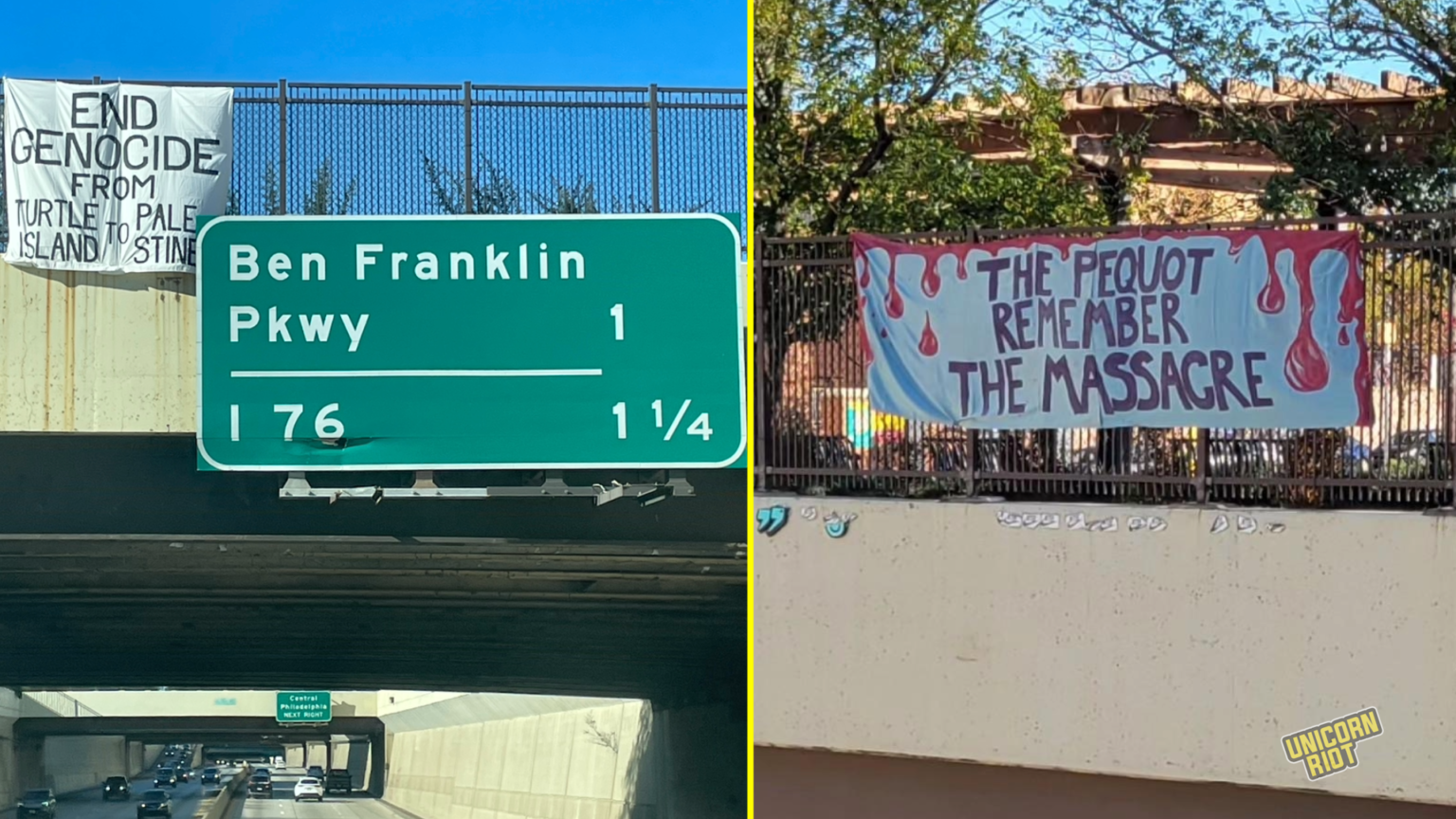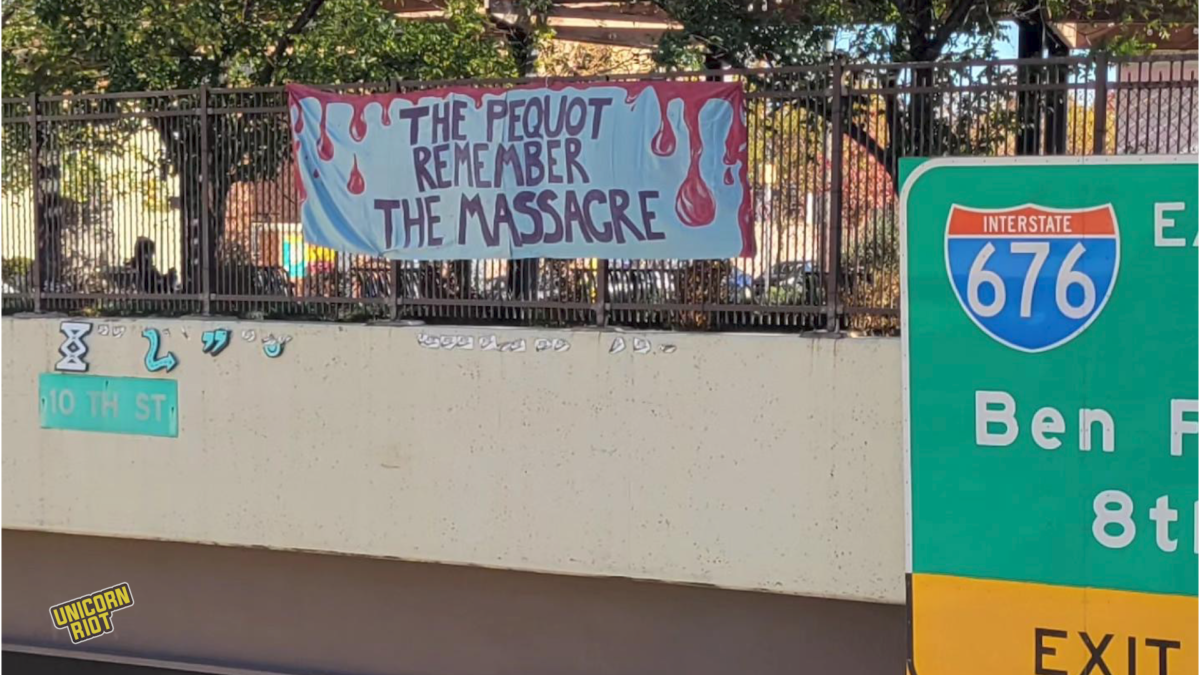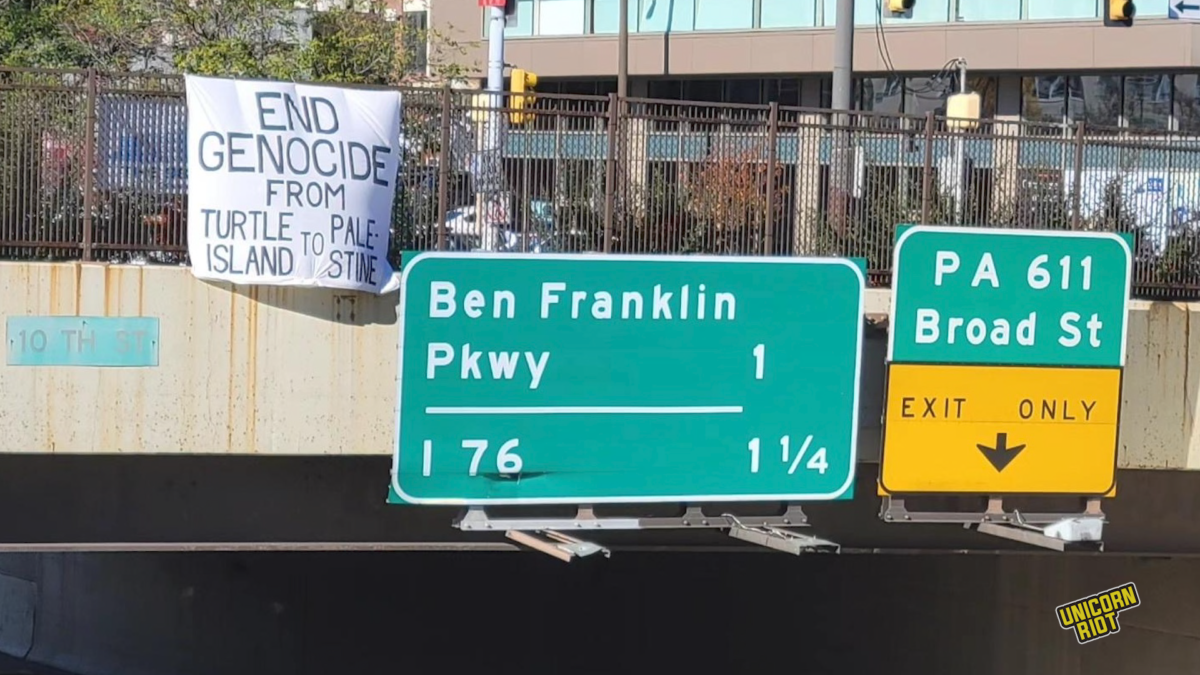from Unicorn Riot

Philadelphia, PA — On November 23, around 11 a.m., Black and Indigenous and anti-Zionist Jewish activists hung banners along Interstate 676, just blocks away from the Thanksgiving Day Parade on occupied Lenapehoking land, otherwise known as Philadelphia. They collaborated to highlight the ongoing injustice and struggles of Indigenous people in the U.S. while also displaying solidarity with those against occupation in Palestine.
Parade floats accompanied by police escorts on all sides sped below the 10th Street overpass just moments before the first banner was hung. It served as a timely punctuation as east bound traffic watched the banner unfurl to read, “The Pequot Remember the Massacre.”

The Pequot Massacre occurred on May 26, 1637. Settler-colonial Puritan soldiers, organized as the Massachusetts Bay Colony Militia, aimed to steal the tribe’s traditional land in a surprise ambush that murdered 700 Pequot adults and children. During the massacre, settlers set fire to the village burning any remaining people alive. Governor John Winthrop declared a celebration of this massacre later that year that some consider to be the first Thanksgiving. The following year, white settlers outlawed the Pequot language and name, seized tribal lands, and forced some surviving Pequot people into slavery. This further galvanized the massacre into a genocide.
The second banner to be dropped from the overpass faced west bound traffic and revealed the words “End Genocide from Turtle Island to Palestine.”

The following day, Black Friday, other autonomous groups got to work hanging banners along this same interstate which runs like a river through the city center. However, on that morning, similar anti-colonial and anti-Zionist messages could now be read throughout this corridor of the city in defiance of erasure.
These banner drops follow acts of nonviolent civil disobedience, direct actions, and marches that have been happening all over Philadelphia on a near-daily basis since Israel began bombing Gaza after October 7.
They also occur within a broader movement framework of autonomous actions across the country that commemorated November 23 as the Indigenous National Day of Mourning — a day that serves to highlight centuries of atrocities committed against Indigenous people and to correct present myths in history texts taught in American schools.
For the last 53 years on the fourth Thursday of November, the Indigenous National Day of Mourning has taken place to “honor Indigenous ancestors and Native resilience. It is a day of remembrance and spiritual connection, as well as a protest against the racism and oppression that Indigenous people continue to experience worldwide.”
Since its first treaty, the U.S. government has continually broken each and every written agreement signed with Indigenous Nations as more white settlers wanted their land. Starting with the Treaty With the Delawares/Treaty of Fort Pitt in 1778 with the Lenni Lenape peoples.
In Pennsylvania in 1782, an American Revolutionary War officer and his militia slaughtered nearly 100 Lenape (mostly women and children) at the village of Gnadenhutten after wrongly believing they were responsible for attacks against white settlers. This led to more settler-colonialists moving onto Lenape territory, before the Treaty of Greeneville in 1795 forced the Lenape and other nearby tribes to surrender most of their lands.
All of this erasure, murder, and forced relocation continued to shrink and control the spaces where Indigenous people could inhabit. Thirty-five years later, in 1830, U.S. Congress passed the Indian Removal Act which codified the violent removal of Indigenous people from their ancestral lands en masse, in what’s known as the Trail of Tears. Today, data shows that Indigenous people in the United States have lost nearly 99% of the land they historically occupied.
Unicorn Riot heard about the aspirations of some of those involved in bringing the anti-colonial and anti-Zionist messaging into Philly’s downtown corporate Thanksgiving space.
UR: Thank you for taking the time to speak with us. Why do you think it’s important for this action to take place on Thanksgiving in the US?
“As an Indigenous activist it’s important to keep reminding people of the brutal history of ongoing displacement and genocide. My heart breaks for people all over the world who are actively displaced for the nation state war machine.
To have traditional food and practices whitewashed and fed back to us as if we should be grateful for the nod to our history while ignoring the part the capitalist U.S. state has played in killing us and our traditional practices is frankly disgusting.”
– K
“Much like we are seeing genocides in Palestine, Congo, Armenia, and Sudan be denied and erased in real time, colonizers have erased the continued and active genocide of Indigenous peoples in the so-called United States. They have taken our feasts and our foods, and have created a celebration from our suffering. They throw parades to commemorate their military victories while our people go hungry on our reservations and in our cities, homeless and in need in our own homelands. But we are here to remind them that we have not forgotten and we will not be silently erased.“
– F
UR: How did you bridge the gap between occupation in the U.S. and occupation in Palestine? What about the Pequot massacre did you want to invoke in this moment?
“To see the defense of Palestine is beautiful, but to condemn one genocide while celebrating another is not justice. Over 700 Pequot women, children, and elders were murdered in a surprise raid while many of their warriors were away. That is the true history of Thanksgiving. That is what is being celebrated today. Regardless of whether you can call it Thanksgiving, Friendsgiving, or your fall feast, if you are not telling the true history & feeling it’s full weight then you are commemorating our genocide. “
– F
UR: What did you want people to take away most from this action?
“I hope that the banners incite conversations that question colonialism here and in Israel. For non-Native people like myself who are gathering with family or friends today, I hope they talk about how to be part of initiating repair and reparations for Indigenous people in the US. Similarly, as an anti-Zionist Jewish person, I hope Jewish families talk about the way our identities and trauma are being manipulated for colonial purposes, and how we can resist that to stand with Palestinians.”
– R
“We should stand against occupation and genocide around the globe, and that begins with the land beneath our feet. We must examine our own role in continued genocide and settler colonialism, and we must take responsibility for ending all States at war with the People, including our own. We are not free until we are all free, and we are not all free until every oppressive force has fallen to the ground. Start where you are, start today, and don’t stop til we free them all.”
– F